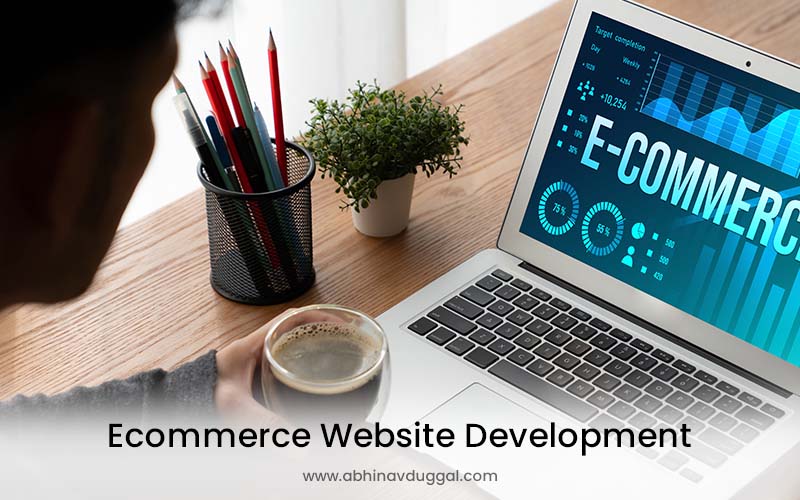Ecommerce Website Development

Ecommerce website development is the process of creating online stores where businesses can sell their products and services directly to customers. It combines web design, development, and technology to create user-friendly platforms that make online shopping simple and secure. A well-developed ecommerce website helps businesses reach a wider audience, increase sales, and build strong customer relationships.
Importance of Ecommerce Website Development
Ecommerce websites have become essential for businesses of all sizes. They allow companies to sell products online 24/7, reach global markets, and compete with larger brands. A professional ecommerce website enhances credibility, improves customer experience, and increases revenue. Businesses with well-designed online stores can also gather valuable data to make informed marketing decisions.
Benefits of Ecommerce Website Development
24/7 availability for customers to browse and shop
Wider audience reach and global market access
Cost-effective compared to traditional physical stores
Easy management of products, inventory, and orders
Secure payment gateways for customer trust
Integration with marketing tools and analytics
Ability to provide personalized shopping experiences
Faster growth and higher revenue potential
Services Offered in Ecommerce Website Development
Custom Ecommerce Website Design
Custom ecommerce design ensures your online store reflects your brand and provides a unique shopping experience. It includes tailored layouts, graphics, and features based on business needs.
Shopping Cart Development
Shopping cart systems allow customers to select products, view prices, and complete purchases seamlessly. A good cart integrates with payment gateways and provides easy checkout options.
Payment Gateway Integration
Secure payment methods like credit/debit cards, UPI, PayPal, and net banking ensure safe transactions. Integration of multiple payment options increases customer confidence.
Product Management System
An ecommerce platform includes tools for adding, editing, and categorizing products. Inventory management ensures products are available, and stock levels are updated automatically.
Mobile-Friendly Ecommerce Design
Mobile responsiveness is critical for ecommerce success. A mobile-friendly website ensures customers can shop easily from smartphones and tablets.
SEO and Digital Marketing Integration
SEO-optimized ecommerce websites rank higher in search engines, attracting more traffic. Integration with digital marketing tools like social media, email campaigns, and ads improves visibility and sales.
Types of Ecommerce Platforms
Open-Source Platforms
Platforms like Magento, WooCommerce, and OpenCart provide flexibility and customization. They are suitable for businesses with specific requirements and technical expertise.
SaaS Platforms
Shopify, BigCommerce, and Wix are SaaS-based ecommerce platforms that offer easy setup, hosting, and maintenance. They are ideal for small and medium-sized businesses.
Custom-Built Platforms
Custom-built ecommerce websites are designed from scratch to meet unique business needs. They offer full control over design, features, and functionality.
Key Features of an Ecommerce Website
User-friendly navigation and layout
Fast loading speed and responsive design
Secure login and registration for users
Multiple payment options and gateways
Product search, filters, and categories
Customer reviews and ratings
Shopping cart and checkout system
Order tracking and notifications
Integration with analytics and marketing tools
Steps in Ecommerce Website Development
Requirement Analysis
Understanding business goals, target audience, and product categories helps define the features and design of the ecommerce website.
Planning and Strategy
A clear plan includes website structure, technology stack, platform selection, and development roadmap.
Design and Development
UI/UX designers create mockups and layouts while developers code the website, implement features, and integrate payment gateways.
Testing and Quality Assurance
Websites undergo testing for speed, security, usability, and compatibility with different devices and browsers.
Launch and Maintenance
After approval, the ecommerce website is launched. Regular updates, bug fixes, and performance monitoring keep the website secure and functional.
Advantages of Professional Ecommerce Website Development
Enhances customer experience and satisfaction
Increases sales and business growth
Builds credibility and trust among customers
Improves search engine rankings and online visibility
Simplifies management of products, orders, and customers
Provides detailed analytics to make business decisions
Supports multi-channel selling and marketing campaigns
Common Mistakes to Avoid
Choosing the wrong platform for business needs
Ignoring mobile optimization and responsive design
Using slow or unoptimized website templates
Neglecting website security and SSL certificates
Poor product categorization and navigation
Lack of clear checkout and payment options
Not integrating SEO and marketing tools
Conclusion
Ecommerce website development is a crucial investment for businesses aiming to grow online. A professionally designed and developed ecommerce website provides a seamless shopping experience, attracts more customers, and increases revenue. From custom design and payment integration to mobile optimization and SEO, hiring experts ensures that your online store performs well, remains secure, and meets customer expectations. By choosing the right ecommerce development company, businesses can achieve long-term growth, expand their reach, and establish a strong digital presence.
Why Customers Loves Us?

15+ Years Of Experience In Digital Industry
With over a decade of hands-on experience, we’ve helped businesses across industries thrive in the digital space. Our expertise ensures strategic, results-driven solutions tailored to your unique goals.

Guaranteed Results

Skilled Professional

Excellent Customer Support

Powerful Tools

Confidential Agreement









